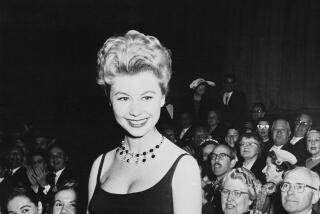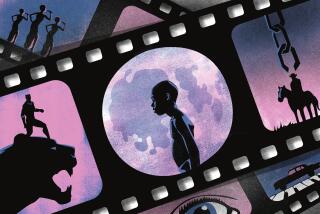Maidie Norman; Actress Fought Stereotypes
Maidie Norman--actress who fought black stereotypes but nevertheless appeared as maids, nurses and housekeepers in such classic movies as “What Ever Happened to Baby Jane?”--has died. She was 85.
Norman, who created and taught a UCLA course in black theater history, died Saturday at her son’s San Jose home of lung cancer.
“When I was young, I was rather attractive and I thought that I would be a leading lady,” Norman told The Times in 1981. “I always thought of myself as a dramatic actress, but of course the opportunities for blacks weren’t there at the time.”
Her only leading film role was in “The Well,” the 1951 black version of the Kathy Fiscus child-in-a-well story.
“I thought ‘The Well’ was going to launch my career,” she said, “but nothing happened.”
Norman dealt with the disappointment by seizing every dramatic stage role she could, from Shakespeare to Jean-Paul Sartre. She also worked to change Hollywood’s view of black character roles.
As the maid to Bette Davis and Joan Crawford in the 1962 “Whatever Happened to Baby Jane?” Norman refused to speak in the “yessum” dialect expected and changed some of her lines.
“I’d say, ‘You know, this is not the way we talk these days. This is old slavery-time talk,’ ” she recalled in a 1995 interview with the San Jose Mercury News.
Norman was born on a Georgia plantation to the engineer son of slave owners and the daughter of one of their slaves, Louis and Lila Graham Gamble, and raised in Ohio. She earned an undergraduate degree at Bennett College in Greensboro, N.C., and a master’s in theater arts from Columbia University.
Wed to McHenry Norman in 1937, the future actress adopted her married name professionally and began working at the Musart Theater in Los Angeles in the early 1940s.
She made her film debut in “Burning Cross” in 1947 and her stage debut as Honey in “Deep Are the Roots” at Los Angeles’ Mayan Theatre in 1949.
Among her films were “Susan Slept Here” and “Airport ’77.” Her stage work included “A Raisin in the Sun” and the title roles in such classics as “Medea,” “Purlie Victorious” and “Andromache.”
Norman also believed that television offered more opportunity for black performers, and appeared frequently in TV movies, series and miniseries into the 1980s. She particularly enjoyed her roles as a blind woman on a “Kung Fu” episode and as an elderly nursing home patient in a PBS play, “Righteous Apples.” In addition to “Roots, the Second Generation,” she had roles on such prime-time series as “Dragnet,” “Cannon,” “Police Woman,” “The Jeffersons,” “Ironside” and “Hotel.”
Norman was named woman of the year by the Los Angeles Sentinel in 1964, was artist in residence at Stanford University in the late 1960s and was inducted into the Black Filmmakers Hall of Fame in Oakland in 1977, which she considered a highlight of her life. She also earned a professional artist award from the California Educational Theatre Assn. in 1985.
In her honor, UCLA gives an annual Maidie Norman Research Award to the UCLA theater arts student who presents the best research paper on the history of blacks in theater.
Norman is survived by her son, McHenry “Skip” Norman; a sister, Clarice Herbert; two stepchildren, Veronique and Lescil Wills; five grandchildren; and four great-grandchildren.
A memorial service is scheduled for 3 p.m. Tuesday at the Alum Rock United Methodist Church in San Jose.
More to Read
Only good movies
Get the Indie Focus newsletter, Mark Olsen's weekly guide to the world of cinema.
You may occasionally receive promotional content from the Los Angeles Times.










